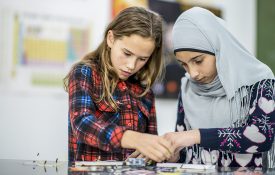-
What the ‘10-Year Challenge’ Might Say About You, and Me
Earlier this month out of nowhere came the “How Hard Did Aging Hit You Challenge” that flooded Instagram and Facebook. The game, better known as the “10-Year Challenge,” couldn’t have been easier: Simply post two photos side by side — an early profile photo from 2009 next to a recent one — as proof positive of how you’ve aged. Or, in many cases, miraculously not aged. It was fun to watch, especially considering how good many of my friends looked. I posted on their feeds. “Ageless!” “Gorgeous X2.” And, “Which is which?” The whole exercise seemed harmless, if a bit self-involved, despite some concerns about privacy.
-
Game Brain Science: How Your Super Bowl Team Plays Can Sway What You Eat
The Super Bowl isn't just one of the biggest sporting events of the year. It's also one of the biggest eating events. And whether your team wins or loses the big game can influence how you enjoy your food – and how much of it you consume – even the day after. That's according to neuroscientist Rachel Herz, who is on the faculty at Brown University and Boston College and author of Why You Eat What You Eat. "Many, many chickens die for the Super Bowl, and it's estimated that people consume, in the four to five hours of the game alone, 2,400 calories," Herz notes, pointing to a popular estimate released by the Calorie Control Council.
-

New Research From Psychological Science
A sample of research exploring income inequality and racial bias, support for resettling refugees, and self-referential stimuli in working memory.
-

Girls Are More Engaged When They’re ‘Doing Science’ Rather Than ‘Being Scientists’
A psychological study suggests a way to keep gender stereotypes from discouraging girls’ persistence in science activities.
-
To ace your Ph.D. program interviews, prepare to answer—and ask—these key questions
You’ve made it to the last step of the Ph.D. application process: the interview. Congratulations! But amid the excitement and butterflies, don’t neglect the crucial next step: preparation. Grad school interviews—in which aspiring graduate students meet with prospective advisers, colleagues, and other students—are opportunities to connect, engage in scientific conversations, and get a hands-on feel for the graduate programs and broader communities. To make the most of them, you need to prepare in advance so that you can confidently and thoughtfully answer questions from faculty and department members who are deciding whether they want to invite you to join them.
-
An expert on human blind spots gives advice on how to think
David Dunning, a psychology professor at the University of Michigan, has devoted much of his career to studying the flaws in human thinking. It has kept him busy. You might recognize Dunning’s name as half of a psychological phenomenon that feels highly relevant to the current political zeitgeist: the Dunning-Kruger effect. That’s where people of low ability — let’s say, those who fail to answer logic puzzles correctly — tend to unduly overestimate their abilities. Here are the classic findings from the original paper on the effect in graph form.

